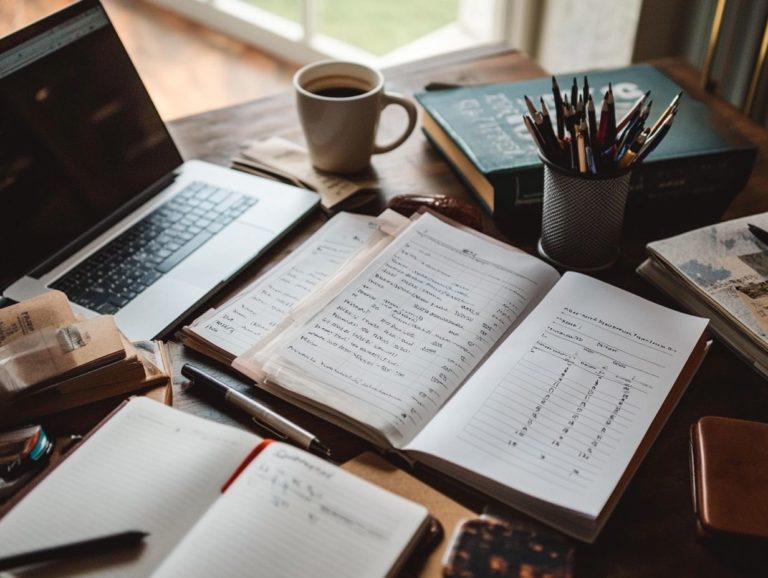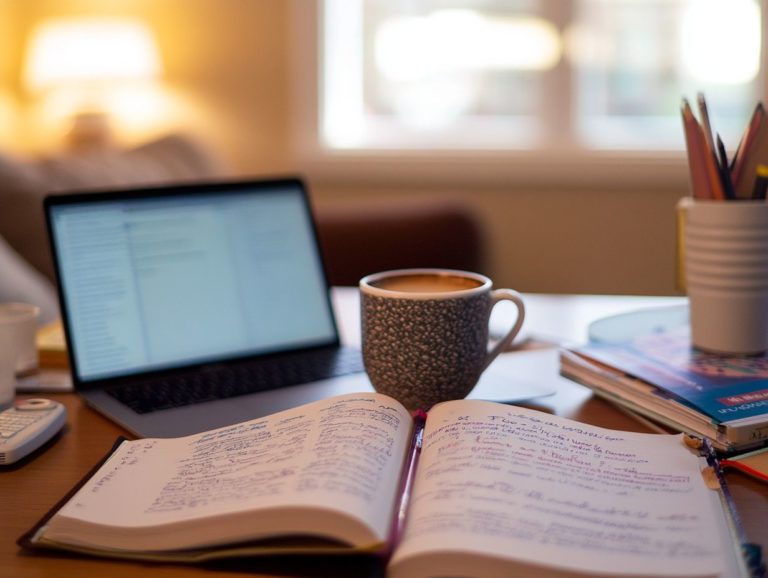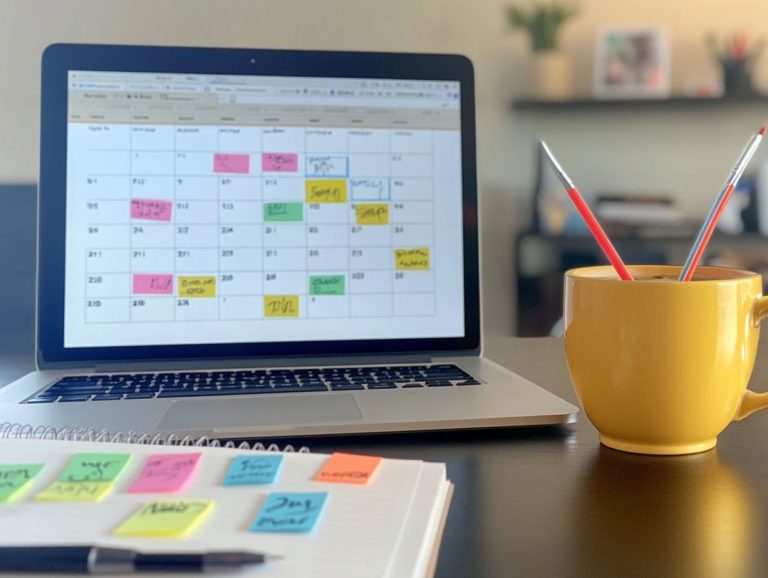how to use flashcards for test prep
Flashcards have long established their status as a favored study tool. Their effectiveness extends far beyond simple memorization.
This article delves into the science that underpins flashcard learning and reveals how they enhance memory retention. You will uncover the secrets to selecting the ideal flashcards tailored to your needs, crafting your own, and seamlessly integrating them into your study routine for optimal results.
We will also explore alternative study techniques that complement flashcard practice. Get ready to supercharge your test prep and achieve amazing results!
Contents
- Key Takeaways:
- The Science Behind Flashcard Learning
- Choosing the Right Flashcards for Your Test Prep
- Creating Effective Flashcards
- Using Flashcards for Test Prep
- Maximizing the Benefits of Flashcards
- Alternative Study Techniques for Test Prep
- Frequently Asked Questions
- How can flashcards help with test preparation?
- What are the benefits of using flashcards for test prep?
- How should I organize my flashcards for test prep?
- How often should I use flashcards for test prep?
- Can I use different types of flashcards for test prep?
- How Should I Review My Flashcards for Test Prep?
Key Takeaways:

Flashcards are effective tools for test prep because they utilize active learning and promote memory retention. Choosing the right type of flashcard, whether physical or digital, can make a difference in your studying. To enhance your experience, consider exploring the best flashcard apps for test preparation. To create effective flashcards, focus on concise and specific information, use visuals, and incorporate active recall in your studying.
What are Flashcards and How Do They Work?
Flashcards serve as a remarkably versatile study tool, perfect for active learning. They are designed to enhance your recall abilities while committing definitions to memory.
These compact cards whether physical index cards or digital versions through various online platforms are readily accessible to learners of all styles, including those who thrive visually.
By incorporating flashcards into your study routine, you can elevate your study techniques and streamline your test preparation.
Tailored for a myriad of subjects like anatomy and medical terminology, flashcards spotlight key terms and complex concepts, promoting a deeper understanding of intricate information.
Their efficacy is backed by neuroscience principles, specifically spaced repetition and active recall. Spaced repetition means reviewing information at increasing intervals, while active recall involves testing yourself on the material.
As you engage repeatedly with the shuffled content, you strengthen your neural pathways, paving the way for improved long-term retention.
This adaptability gives the power to both educators and students to leverage flashcards for effective learning, irrespective of educational background or learning preference.
The Science Behind Flashcard Learning
The science underlying flashcard learning is connected to neuroscience, where principles such as spaced repetition and active recall play pivotal roles in enhancing memory retention.
These techniques harness cognitive principles to refine the learning experience, positioning flashcards as an exceptionally effective study tool for those preparing for exams like the MBLEx in massage therapy.
How Flashcards Help with Memory Retention
Flashcards are powerful tools for enhancing your memory retention. They employ various techniques that strengthen your memory pathways, especially beneficial during test preparation.
By integrating practice questions and leveraging the picture superiority effect, you can recall information more effectively, making your study sessions significantly more efficient.
These interactive prompts challenge your mind while encouraging active recall, a critical component for solidifying knowledge. Including visual aids engages different cognitive pathways, making the material more relatable and easier to digest.
As you navigate your study sessions, arrange your flashcards to reflect a progressive learning journey from fundamental concepts to more complex ideas. This tailored approach caters to diverse learning styles, appealing to both visual and auditory learners.
This versatility positions flashcards as not just handy memorization tools, but as essential elements of a comprehensive study strategy that resonates across various educational contexts.
Choosing the Right Flashcards for Your Test Prep
Selecting the right flashcards for your test preparation is crucial for optimizing your learning potential. Additionally, understanding how to use timed quizzes for test prep ensures that your study sessions are as effective as possible.
You have a variety of options at your disposal, from auto-generated flashcards to tailored study guides, each serving as a potent memory aid.
Incorporating techniques like color-coding your flashcards can significantly elevate your learning experience, particularly for visual learners. This helps them organize and retain information with greater ease.
Start using flashcards today to maximize your study efficiency!
Types of Flashcards and Their Features

You ll find a variety of flashcards, each designed to cater to your specific learning needs and preferences. Whether it s traditional index cards, sleek digital flashcards, or specialized muscle flashcards for subjects like anatomy and massage therapy, your choice can significantly influence the effectiveness of your study sessions.
For instance, traditional index cards offer a tactile experience that encourages physical writing, which can enhance memory retention. On the flip side, digital flashcards found in user-friendly apps can incorporate multimedia elements, like images and audio, that elevate your comprehension.
In complex subjects such as language acquisition or medical terminology, specialized flashcards often feature spaced repetition reviewing information at set intervals for better memory retention. This ensures that you review key concepts at the optimal intervals for maximum retention.
By blending technology with educational strategies, you can turn mundane study habits into dynamic learning adventures, giving you the power to study more efficiently and effectively.
Creating Effective Flashcards
Crafting effective flashcards is crucial for maximizing the impact of your study sessions. This process involves blending various techniques, such as mnemonics and succinct summaries of detailed lecture materials.
By integrating strategies for quick reviews and engaging learning activities, you can significantly elevate your understanding and retention of complex concepts.
Tips for Creating Flashcards That Work
Make flashcards that resonate with you! This personal touch turns them into powerful tools for active learning and effective practice. Focus on enhancing your recall ability by incorporating memory triggers, clear definitions, and engaging visuals.
Consider that each person processes information differently. If you’re an auditory learner, flashcards featuring mnemonics or short audio clips can significantly improve your learning experience.
Using bright colors and creative imagery can dramatically enhance retention for visual learners. Regularly reviewing and committing to dedicated practice sessions will help solidify information in your long-term memory.
Mixing in mini-quizzes or engaging in peer discussions not only reinforces your understanding but also makes the learning experience interactive and enjoyable. This approach can ultimately lead to improved academic performance.
Using Flashcards for Test Prep
Using flashcards for test preparation can dramatically elevate your knowledge retention and enrich your review sessions, especially when you learn how to use technology to enhance test prep, transforming them into interactive learning experiences.
Incorporating flashcards into your study routine helps reinforce key concepts and boosts your test performance.
Incorporating Flashcards into Your Study Routine
Incorporating flashcards into your study routine is essential for crafting an effective exam strategy. This approach facilitates spaced repetition and organized practice sessions that reinforce your learning.
Dedicating time to quick reviews optimizes your study habits and enhances your overall preparedness for exams. To seamlessly integrate this technique, schedule short, focused review sessions into your daily routine ideally lasting 10 to 15 minutes each day.
This timing allows you to revisit content regularly without feeling overwhelmed. Setting reminders or using dedicated flashcard apps can further support your consistency.
Balancing flashcard usage with other study methods, like summarizing notes or engaging in group discussions, ensures you adopt a well-rounded approach. This combined strategy boosts retention and makes the study process more engaging and effective.
Maximizing the Benefits of Flashcards

To truly maximize the benefits of flashcards, use them as a tool for efficient studying, creating abundant learning opportunities that deepen your understanding of concepts.
By employing a variety of strategies, you can boost your engagement and fully leverage your study sessions, ultimately leading to enhanced academic performance.
Ready to take your studying to the next level? Let’s maximize those flashcards!
Strategies for Effective Flashcard Use
To use flashcards effectively, embrace strategies like active recall and reviewing material at increasing intervals. These methods provide instant feedback and cultivate efficient studying habits. Engaging actively with the material is key to retaining information over time.
Active recall is about testing yourself on what you’ve tried to memorize. Rather than passively reviewing, you push your brain to retrieve knowledge. Flashcards are perfect for this; the question on one side prompts your thought process and memory, and flipping the card reveals the answer.
Now, let s talk about reviewing material at increasing intervals. This technique involves scheduling reviews at widening intervals, reinforcing your memory and preventing cramming. By incorporating these strategies into your study routine, you can significantly boost your comprehension and recall abilities, paving the way for improved academic performance.
Alternative Study Techniques for Test Prep
Alternative study techniques for test preparation beautifully complement your flashcard use. They offer engaging learning activities that promote interactive studying.
Incorporating these methods enhances your understanding and retention, ultimately elevating your test performance to new heights.
Other Methods for Preparing for Tests
Consider other methods for preparing for tests, such as self-referential encoding and detailed lecture materials. Pair these approaches with educational apps to enrich your learning experience. These strategies complement traditional study tools like flashcards, ensuring you re well-equipped for any exam.
Using mnemonic devices and reviewing material at increasing intervals can elevate your retention, especially when tackling complex subjects. While flashcards serve well for quick reviews, combining them with mind maps or summarizing material in your own words can deepen your understanding.
Join a study group! It sparks discussion and drives deeper understanding. Additionally, practice exams simulate real testing conditions and help you identify any knowledge gaps. By blending these diverse study techniques, you can craft a dynamic and effective preparation strategy tailored specifically to your needs and learning preferences.
Frequently Asked Questions
How can flashcards help with test preparation?

Flashcards are a useful tool for studying and memorizing information. They break down complex concepts into smaller, bite-sized pieces that are easier to remember. By consistently reviewing flashcards, you can strengthen your knowledge and recall for an upcoming test.
What are the benefits of using flashcards for test prep?
Using flashcards has several benefits. They are portable and can be used anywhere, making it easy to study on-the-go. Flashcards promote active learning, which is more effective for retention than passive studying methods. They also help identify areas where you may need to improve and provide a visual aid for better understanding.
How should I organize my flashcards for test prep?
Organizing your flashcards depends on your personal studying style and the material you are studying. You can group them by topic, formula, vocabulary words, or any other relevant category. Color coding or using different colored markers for different subjects or levels of importance may also be helpful.
How often should I use flashcards for test prep?
The frequency of using flashcards varies for each individual. It s recommended to use them regularly, at least a few times a week. This helps reinforce the material and prevents cramming the night before the test.
Can I use different types of flashcards for test prep?
Yes, there are various types of flashcards you can use for test preparation. Traditional paper flashcards are popular, but digital flashcard apps and online flashcard websites are also available. Some people prefer handwritten flashcards, while others find it more convenient to type them on a computer. Experiment with different types to find what works best for you.
How Should I Review My Flashcards for Test Prep?
Reviewing flashcards can be fun and effective. You can go through them one by one or quiz each other with a friend.
Try reviewing cards more often when you struggle with them. This method helps reinforce what you need to learn.
Shuffle your cards regularly. This prevents you from memorizing them in their order.
Explore different methods. Discover what works best for you and enjoy the process!






